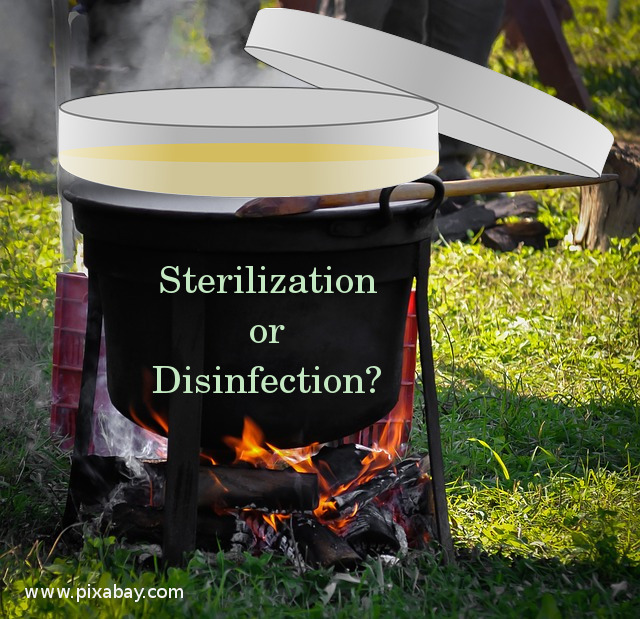I've written a 4 part post a long time ago about sanitization, sterilization and disinfection, their differences and how they are wildly interchanged by laypeople and even sometimes by professional.
That was a long post and since in everybody is looking for one sentence answers nowadays, I've packed the most important data from that post in the following infographics.
- How shall I sterilize my bottles and instruments?
- Shall I purchase a UV-sterilizer?
- Are Baby bottle sterilizers suitable for my cosmetic jars and bottles?
and similar questions are the most freaquently asked questions by artisan soap and cosmetic manufacturers. Sadly, disinfection, sterilization and even sanitation are even exchanged or interchanged by professions. Tale those pretty UV-cabinets as an example. They look very tempting and many of you have asked me whether they could be effective on your cosmetic lab and production or not. Well, to be honest, UV-light can only disinfect and not sterilize. The main purpose and function of those cabinets is to protect the instruments that already sterilized or disinfected from air contamination. It means, the inner room of the cabinet is free of contaminants and your bottles and instruments which you put in the oven (if they are already disinfected) remain clean and free of contaminants. They can and would not disinfect your bottles and instruments.
In a cosmetic lab, you want to (and should) avoid any contamination of your instruments, raw material, containers, counter, filling machines and finally your finished product. Your hygienic plan should be a part of your GMP.
Let's mention the most important things you need to know:
1- Since you are not working under sterile conditions (something they do in surgery rooms and in clean rooms where surgery instruments, single dose pharmaceuticals such as eye drops or electronic chips are manufactured) there is absolutely no need for sterilization. This is something that often confuses students and artisan manufacturers.
2- Disinfecting your instruments and jars as well as your counter and equipments is completely enough for a cosmetic lab or production
3- Most suitable methods for you as a skin care formulation student, artisan manufacturer or hobbyist include:
- Applying boiling water whenever possible
- Disinfecting with alcohol (ethanol prepared from distillation is the most naturally available disinfectant. n-propanol and iso-propanol are synthetic alcohols) is quite effective.
- Vodka is a good substitute for ethanol if you have no access to ethanol
- You may want to use denatured alcohol (alcohol which is not drinkable anymore because something is added to it) because of your religious preferences or high taxation of alcohol in your region or other legal limitations
- Hydrogen peroxide is another alternative for disinfection for those of you who want to avoid alcohol in any case (Halal cosmetics for example).
Keep in mind that hydrogen peroxide is a strong oxidant, you need to rinse your instruments and specially your jars with freshly bpoiled distilled water tp avoid any oxidation of your cosmetic products if you choose to use this disinfectant.

If you're a student of Formula Botanica you'll have a complete guide to hygienic preparations in your cosmetic lab under module I of the CNCP course.
Thank you for being here and for sending me your comments. I really enjoy your participation in our Facebook discussions. Feel free to ask your questions. I try to (but not promise) respond to them in 24 hours.
Be Happy and have fun



